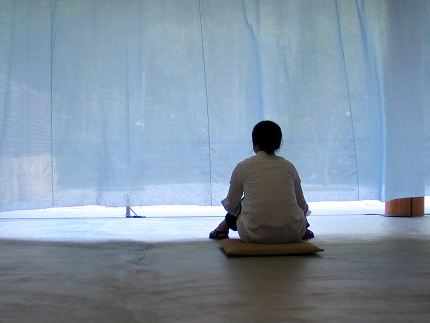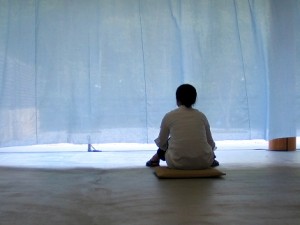When I first finished divinity school, I subscribed to a journal of Christian spirituality called Weavings. That was when I first heard of the concept of “active waiting.” Often associated with the liturgical seasons of Lent and Advent, “active waiting” describes the way in which believers wait for a great spiritual event. In the Christian tradition, this spiritual event is often associated with Jesus: waiting for Jesus’ birth; waiting for the second coming of Christ; waiting for the crucifixion and resurrection; waiting for Jesus to be revealed; waiting for the Holy Spirit to come.
In the days and weeks after the crucifixion and resurrection of Jesus, the disciples are often portrayed as waiting. I am fascinated by Luke’s way of recounting this. The disciples have interacted with a risen Jesus. They have broken bread with him. They are talking amongst each other. Jesus appears again, speaks some words of wisdom and concludes with these words: “And see I am sending upon you what God promised; so stay here in the city until you have been clothed with power from on high.” (Luke 24:49) Then Jesus walks a ways with the disciples and, as the tradition names it, ascends into heaven.
While there is rich theological material to explore about whether or not Jesus ascended into heaven or not, and whether resurrection is heavenly or earth, bodily or metaphorical, what really captures my attention is the way the disciples are told to wait.
Stay here
Stay here until
Stay here until the power comes
Wait
Just wait
So they wait. They go to the city and wait. But, the scripture goes on to say, the disciples don’t sit around twiddling their thumbs. Rather, they go to the temple and worship and praise God continually. They wait actively.
The great priest and author, Henri Nouwen, says that waiting in scripture is not like waiting for a late bus. He writes:
“Those who are waiting are waiting very actively. They know what they are waiting for is growing from the ground on which they are standing . . . That’s the secret. The secret of waiting is the faith that the seed has been planted, that something has begun. Active waiting means to be present fully to the moment in the conviction that something is happening where you are and that you want to be present to it . . . Waiting, then, is not passive.”
Spiritual leaders often use this concept of active waiting to help us to develop the spiritual art of patience. We should practice waiting with prayer and worship and spiritual disciplines. Because, they say, we trust that Jesus will be born, that the Holy Spirit will come, that Christ will return. The liturgical seasons of Lent and Advent remind us to ritually practice waiting for God and trusting in God’s promises
Contemporary society is often accused of being bad at waiting. We’re impatient. We’ve become accustomed to a greater level of immediate gratification than previous generations. Technology facilitates this. We are able to Google information we want. We have 24-hour news cycles. Media images flash by quickly. We don’t have to wait in the ways that previous generations waited. We’re not even accustomed to waiting.
There’s a lot of waiting that occurs in the lives of people who live with depression. In between the desire to be well, and the end of the commercial where the woman runs through the sunny field with a kite and happy children . . . is a lot of waiting. We wait to feel better. We wait to get better.
One of the worst waitings is the season when one waits for medication to work. Psychiatrists will often say that it takes about six weeks to begin to feel the effects of psychotropic medications. And so we have to be patient. We can’t expect to feel better immediately.
This is a tortuous kind of waiting. After all the time of desperate illness, after finally deciding to be well, after finding a doctor you can afford, get to, and who seems to understand what you’re going through (which is another post all in itself), you’re given medication and told – it should start to kick in in, say, six weeks. Could anything be crueler?
In my life, this kind of waiting has an active component as well. Waiting for medication to work is figuring out how strong to steep ginger in tea to cut the incessant nausea of the new pills. Waiting is lying very still on the couch because walking from one room to another in my small apartment makes me dizzy. Waiting is making bland foods with lots of nutrition because I vomit everything spicy and tasty for two weeks. Waiting is driving on curbs and parking at an angle for weeks until I realize that the medication affected my vision and that was somewhere in the 2 sheets of fine print I received from the pharmacist. Waiting is taking the other pill to get rid of the anxiety caused by the pill that is supposed to make me happy. Waiting is calling the doctor back after declaring I can take it no more, and picking another drug, and going to the pharmacist and trying it all over again.
This is the unseen active waiting for many people who live with mental health challenges. Waiting for health. Waiting for happiness. Waiting for the holy spirit of wellness. Waiting for a change to come.
Sometimes I wonder if the Christian tradition hasn’t sanitized the disciples’ active waiting. I wonder if the gospel writers made the disciples more patient and pious because the writers knew the end of the story. (After all, when the early Christians find themselves waiting for the second coming of Jesus far longer than they expected, we get more stories of impatience and frustration.) I wonder if the disciples weren’t as anxious and scared and tired as depressed folk can be when waiting for medication to work. I wonder if our religious faith might not feel more accessible if we told that story.
I’m not suggesting that we shouldn’t try to cultivate patience, or that spiritual practices are to be eschewed. Prayer and worship are good things. But, today, I’m not willing to glorify waiting either. Sometimes waiting sucks. Sometimes waiting feels horrible. Sometimes waiting seems like a harsh penalty meted out to someone who has finally admitted what’s wrong, and finally found a doctor. Asking someone to wait seems unkind to ask of someone who has finally found faith.
This may be a truism of faith: that there’s a lot of painful waiting involved. This may also be the only short cut to waiting for medication to work: faith. I’ve never heard a doctor say it this way, but they’re asking you to have faith in the pill. Have faith that it will work eventually. Have faith that if this one doesn’t work, then they will find another one that will. Have faith in the process of feeling crappy before you feel better.






Yes, active waiting is both a blessing and a curse. A blessing in that through deep faith, we know, like we know, like we know that what we have meditated and prayed upon is going to happen. The curse is in the waiting to activate into manifestation.
Waiting can make challenges appear more challenging but I think that there is something to be said about the human spirit that sustains us and gives us will during challenges and impatience. Does it [this human spirit] make us feel good during these periods? For many of us, no. But it does provide strength and tenacity for us while we wait, while we are transforming (some of us), and while we are healing.